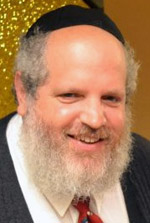Chukat – Balak
By Rabbi Yeruchem Eilfort

CARLSBAD, California — This week we read the double portion of Chukat – Balak. Chukat means decree and Balak was the name of the King of Midian who sought to destroy the Jewish people. The first portion discusses the mysterious Mitzvah of the Parah Adumah – the Red Heifer.
We are taught that there are three categories of commandments; Judgments, Testimonials, and Decrees. Judgments are the commandments that we understand on our own that they need to be done. For instance, we realize the importance of having fair weights and measures, or of making sure our property doesn’t damage another, or that we should return lost objects.
Testimonial commandments are also logical once we are told about them. For example it makes perfect sense to eat Matzah on Passover or build a Sukkah on Sukkot. Once the commandment has been given and the Torah explains its context we ‘get it’.
The third category of commandment, Decrees, are a different matter. G-d decrees that something should be done and we do it. Examples of decrees are the Mitzvah of Shatnez – not to interweave wool and linen together – or our Mitzvah – the Red Heifer. It is beyond human logic; even King Solomon, the wisest man could not fathom this particular commandment. A person who had become ritually impure by touching a dead body could only become ritually pure again through fulfilling this formula. A completely red heifer would be burned to ashes and the ashes would be sprinkled on the impure person by the Kohen. Then, and only then, would he be considered pure again and eligible to enter the Holy Temple and bring sacrifices. The Kohen who sprinkled the ashes actually became impure for the day!
While we do not understand why this particular commandment was given we can easily understand its importance. The Torah’s Decrees remind us that there is a Superior Power in the world. The prophet tells us, “My thoughts are not your thoughts.” This means that we can never fully understand the divine commandments, but we fulfill them nonetheless.
The portion begins, “Zot Chukat haTorah,” which means this is the Decree of the Torah. Why did it not say this is the decree of the Red Heifer? Answers our Sages, because our approach to the entire Torah must be like our approach to this Mitzvah. We do the commandments because they come from the Commander in Chief, NOT because we grasp them intellectually or get a reward for fulfilling them. We acknowledge that G-d knows better. Therefore this Mitzvah is critical. Every Mitzvah is critical.
The second portion is named after a very evil man, Balak. He hired the wicked gentile prophet Balaam to curse the Jewish people. G-d foiled his plans by making Balaam bless the Jews instead. Every time he opened his mouth to utter a malediction out came a benediction.
Why would Balak be given the high honor of having a portion named after him?
I thought long and hard about this question and I have a theory. It could very well be wrong, but it’s the best I could come up with (without reviewing all of the commentaries). Balak was no fool. He saw his neighbors who were mighty kings try to militarily defeat the Jews to no avail. He understood that as long as the Jews are connected to G-d they are unassailable. He therefore tried to destroy the nation in a different way – by sundering their spiritual connection to G-d (that which Balaam was trying to attack by attempting to curse them).
Thank G-d his attempt failed. But he demonstrated a very important lesson for all of us for all time. Our strength comes because of our spiritual connection with G-d, not because of our well-trained and equipped army. Balak showed us clearly that as long as we nurture and nourish our connection with G-d, we will be protected and victorious over our enemies. I am thinking that this lesson is what gave Balak the merit of being remembered for eternity.
We all have lots to do. We have to make a living so we can pay our bills. We have to tend to our family, friends, and community. We are busy, busy, busy! We need to know that we can and will overcome all of the internal and external enemies, and we will do so by proactively working on our connection with the Almighty!
Wishing everyone an uplifting, joyous, and HEALTHY Shabbos!
*
Rabbi Yeruchem Eilfort is Director of Coastal Chabads and Chabad at La Costa. Rabbi Eilfort welcomes readers’ comments and questions and may be reached at RabbiE@ChabadatLaCosta.com.